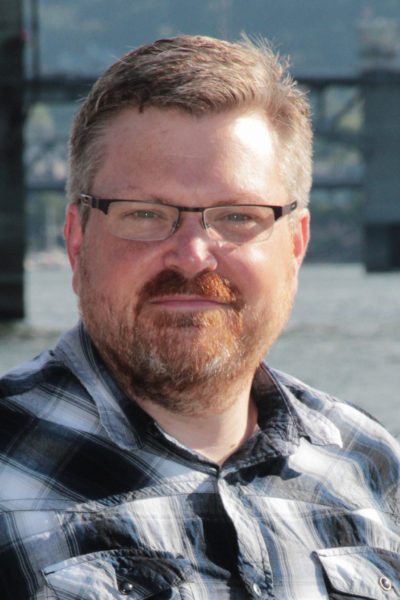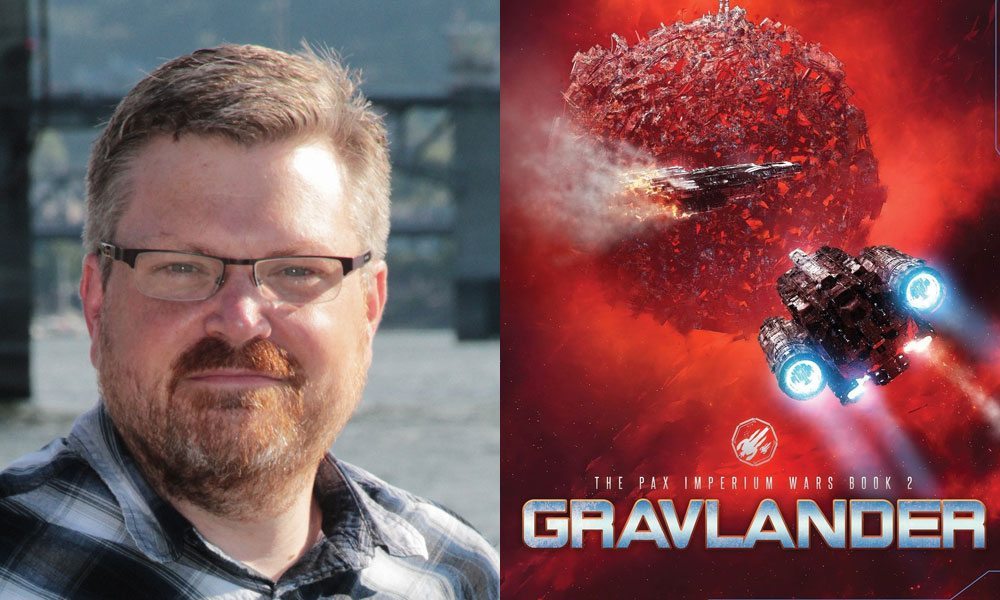
When GeekDad Erik Wecks is not running kids, doing laundry, or making dinner, he can usually be found writing fiction at the local library. (And when he’s not writing, he and his family enjoy gardening and playing Dungeon & Dragons 5e.)
Today is a day of celebration for all that hard work, as it’s release day for Gravlander, the second novel in his Pax Imperium Wars science fiction series.
After reading an advance copy of the book, I put together interview questions for him about the book’s themes and inspiration, hopefully avoiding spoilers for those not familiar with the series. (If you’re interested in a sample of Erik’s writing, you can sign up for his email list at Instafreebie and pick them up there.)
For those not familiar, the Pax Imperium Wars series focuses on Josephine, a young woman who’s lost her family and her planet, and is coming into young adulthood hoping to find some reason to live, and, eventually, a reason to thrive. But in a fleet that’s full of refugees and still on the run from the main Empire, that is not proving easy. After reading the book, I naturally had some questions for the author.
Note: only extremely mild, light spoilers in the interview and only for the very beginning of the book. For a full review, see GeekDad’s James Floyd Kelly’s post today.
GeekMom: Gravlander, to me, seems at the heart to be a story about dealing with trauma and then deciding who you are and who you want to be, even under the worst circumstances.
Erik Wecks: Yep. I like that summary.

GM: Your heroine, Josephine, is what we’d call depressed and suffering from PTSD at the beginning of this novel–and includes a scene where she’s almost suicidal. What drew you to this kind of character? What did you find hardest to write about her? What was the easiest emotion to draw out of her?
EW: I like broken people. I find a kind of honesty that appeals to me in people who try to make their way in life but have mess they can’t quite hide. Give me a Mal Reynolds and the crew of the Serenity any day over Star Wars. My character, Jo, is desperately trying to hide her mess, trying to be a success without dealing with the past, and I think that is where many of us start adulthood. At least that is where I started. At some point most of us, if we’re thoughtful, have to do some looking back and make some adjustments.
The scenes where she’s emotional and depressed were very difficult to write for me. I don’t have a clinician’s eye when I write. I don’t stand outside the patient analyzing their psyche. I have to empathize with Jo’s emotions at least a little to give them voice. So I know those thoughts and emotions. I’ve dealt with them myself. There is one scene where Jo hurts herself to feel good, and while I’ve never self-harmed in that way, I can see it from where I stand. I can understand how that might work.
After what I just said about empathy, I’m a little embarrassed to say that the easiest emotion for me to draw out of her was self-pity, but that was really dangerous to put in as a writer. I went through a lot of drafts of Jo to get women, in particular, to enjoy her. No one wants to identify with a character who wallows in self-pity, and as Jo is a woman, my female readers were often more frustrated with her. I needed many passes to get her right. I’m happy with the result. I hope at the beginning Jo comes off as distant from people and lonely instead of whiny, which was the feedback I received. You’ll have to read the book to see where she ends up, but I will say that I like hope, and I try to include it in everything I write.

GM: There is a clear sense of alienation in Josephine’s story—she’s alienated from her own Fleet and then she’s, well, among a completely new people. Was that a conscious metaphor? Why did you choose that particular journey for Josephine?
EW: Conscious metaphor, no. But I will say that I knew that Josephine’s growth would be hampered by her own ability to succeed. In the first two Pax Imperium books, she’s a bit of a savant. And now she’s a genius doctor and that’s a problem because she could go through life being a great doctor and never having to face her sadness and misery. I think life can be like that sometimes. We succeed in one aspect of our lives and trade on that success to hide our failure in other areas. So when I asked what it would take for Jo to change, to grow up emotionally, failure had to be a major part of the equation. Also, Jo keeps people at a distance at the beginning of the book, and I wanted to take her on a journey that would challenge that behavior. To do that end, I didn’t see how it could change until Jo was truly alone and wholly dependent on her own resources. Only then would she find out that independence isn’t always as satisfying as we think it will be.
GM: The Timcree society that Josephine attempts to help was fascinating. What went into their development?
EW: A lot of time and careful thought. I knew I wanted to have a marginalized culture living separately within a dominant culture. The best example that I could think of was the Romani culture in Europe. So I read several ethnographies on the Roma people group, with all the problematic colonialism that goes into that. But I’m comfortable with that gaze in Gravlander. I think it’s the right gaze. Jo is definitely going as a colonialist to the Timcree. She wants to come in with her better medicine and save them, to uplift them. And the truth is, I don’t think she ever gets over that. I don’t think she understands. I won’t tell you how, but I think I make clear that Jo’s lack of understanding causes her trouble in the end.
I think that’s the right gaze for any book that I write about a non-dominant culture. I’m a cis white male who will still call himself a Protestant Christian when I’m not too embarrassed by other Christians to do so. I think that even in science fiction where I’m making it all up I can’t assume I will get it right when it comes to marginalized groups. So giving my character a colonial approach to the situation gives me a margin of safety as a writer when it comes to getting the voice right. (Sorry, that was a bit academic. The easy way to say it is I have privilege, and I can’t step outside all of it even when I’m making it all up in genre fiction.)
There’s a scene where Jo thinks she’s finally understanding Timcree culture because she’s manipulated some of them into doing her bidding. She thinks she’s finally getting it and the Timcree next to her has the opposite reaction. He says she doesn’t understand the Timcree at all, and that’s my own point of view on the Timcree. There are some bits that are my own, there are some that are very loosely inspired by colonialist ethnographies of the Roma, and there are some bits that emerged from the story itself. However, I could imagine writing a short story that would overturn all of it and give us a completely different and almost contrary perspective on the Timcree. I really like that idea a lot. Hmmm… going to have to think about that.
I was super grateful when the original serial was posting on GeekDad, and I heard from a first nations person from Canada wondering how I understood his culture so well. That’s probably one of the most gratifying letters I’ve ever received as a writer. I’m glad it resonated with someone.

GM: The novel ends on a somewhat hopeful note but there’s clearly more to Josephine’s story. Where do you see her journey next? What can readers expect in a follow-up story?
EW: This is the third novel I’ve written in the Pax Imperium universe. However, I wrote it so that someone who hasn’t read any of the other books could sit down and enjoy Gravlander on its own. There are at least two more novels to come, and I know that Jo will have an important role to play in the next one. In fact, it was that role that inspired me to write this book. Between The Far Bank of the Rubicon, and the fourth book, Athena’s Revenge, Jo is going to go from age fourteen to around age twenty-four. That’s a huge change in personality for anyone, and I wanted to flesh out what those changes would be. I’m also pretty committed to better representation in the Pax universe, and I hadn’t written a book yet with a clear female lead. (Thank you, Anita Sarkeesian.) There are female POV characters in The Far Bank of the Rubicon, but it is really Jonas Athena’s story. Who will play the lead in the fourth book? I’m not sure. I’m debating that right now. I want to judge some of the reaction to this book before I decide how dark I want to go in the next. Let’s just say things are going to get ugly.
GM: You’ve written finance books (non-fiction) and fiction in the SF/F genre. Any skills that overlap? What went into your choice of SF/F as genre? Was it influenced at all by your favorite stories growing up?
EW: Oh, that personal finance book. Yes, it’s still my bestseller, much to my wallet’s joy, and my own personal chagrin. How to Manage Your Money When You Don’t Have Any is a great personal finance book that has been on the Amazon budgeting bestseller list continuously since 2012. I’m so grateful that it has helped over 80,000 households with their finances, but I really enjoy writing fiction.
Is there any overlap? Other than writing, I don’t think so. Although clear entertaining text is still a hard thing to create whether it’s fiction or personal finance, and I do try to entertain when writing about both.
I have always been a huge science fiction fan. As a kid, I loved Star Wars, Battlestar Galactica, Buck Rogers, and Star Trek. But in truth, I was more into Tolkien than I was Bradbury or Heinlein when I read, so I’m woefully under-read when it comes to the science fiction classics. But I write science fiction because I believe that the next thousand years of humanity belongs to the stars. I think we will become a multi-planetary species near the end of my life or maybe a few years after. And that’s the big hurdle. Once that gate opens, we have a lot of room in the solar system to expand. The stars will come later.
In the opening of his book, The Pale Blue Dot, Carl Sagan says, “Our planet and our solar system are surrounded by a New World ocean, the depths of space. It is no more impassible than the last.” I believe that to be true. The only thing that stands in our way is our inability to dream.


